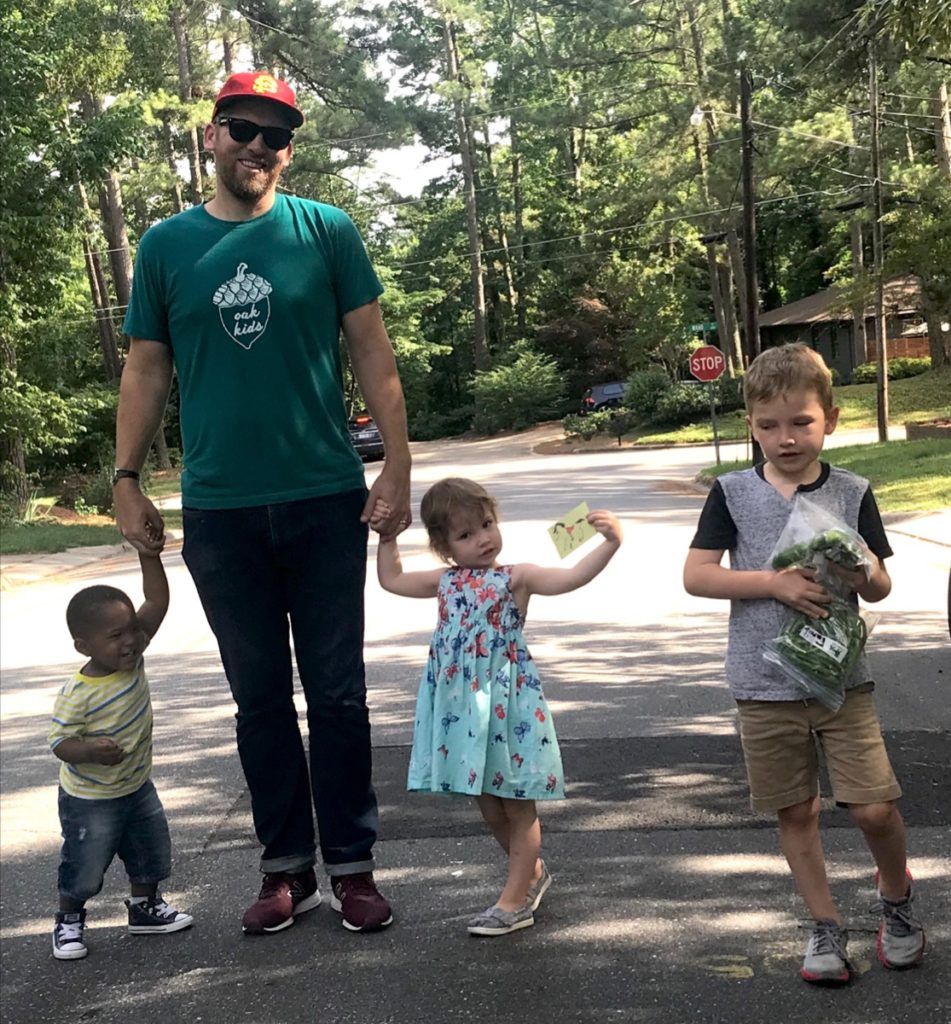Oak Church, Durham NC

Chris Breslin
serves as the pastor at Oak Church
in Durham, NC. In the summer of 2014, the Gathering Church sent Chris and Rachel Breslin along with a core team to plant a church in the Lakewood neighborhood of Durham. Oak Church launched on October 26, 2014 after a huge neighborhood block party and pig pickin’. The church gets its name from Isaiah 61: “Oaks of Righteousness, a planting of the Lord for the display of His Splendor,” and strives to be a community of “ hope, healing, and hospitality in and through Christ.”
Chris is the proud husband to Rachel, dad and jungle gym to Noa June (2011), Titus Eliot (2013), Emett Ruth (2015), and Simeon Holmes (2017). He enjoys reading and learning about intersections between theology and the arts, tending a small flock of laying hens named after pop divas, adding to his vinyl music collection, following FSU football, Bulls baseball, and Duke hoops.
How would you describe the area your church is in?
Urban/University Neighborhood
How would you describe the journey of pastoring Oak Church? What have been some of the milestones/different seasons?
Our journey has been a patient journey of learning how to be good neighbors. We had a place before we had a church, and a block party before we had a worship gathering. For that party, about 300 neighbors/strangers showed up. The next morning, 2 new people came for worship. This disabused us of the notion of “if you build it they will come” or that being neighbors and building relationships of trust and care would be quick and easy.
Looking back, what do you know now you wish you had known when you first started Oak Church?
To some extent, I’m glad that our knowledge and understanding of this place has been gradual and ongoing. It’s forced us to pay more attention. I probably would have prayed for and invested more in an older contingency for our initial core. Relying on tested wisdom and stability.
As you think about what you’ve been able to do so far in ministry there what are some things you have done/tried that have worked well?
1) Experiencing liturgy/church year as hospitality- this framework has connected us to Church beyond ourselves, oriented us to a steady backbeat bigger than our emotions or timeframes, and created space for folks at every stage of their journey of faith in Christ. 2) Partnering with other institutions in the neighborhood and experiencing others not as rivals, but as neighbors, people of peace, and potential collaborators for the good of our neighbors.
What hasn’t worked so well? What have you had to rethink/reimagine/rework?
I think we drastically underestimated our ability to develop stable leadership in such a highly transient area. We invest and equip quite a bit, but often don’t get to experience the fruit of this work. I would have imagined much more stability and continuity in our leadership. This has caused us (in an ongoing way) to reconsider how we structure and what we expect.
What is one failure you experienced and what did you learn from it?
To a large extent, these past (almost) five years, have been haunted by a sort of “Spiritual FOMO.” I fight the feeling that I’m/we’re missing out on something the Spirit is doing or someone the Spirit is giving us as a gift. That I don’t have eyes or an imagination for receiving, developing, and deploying these gifts. There have been many failures which validate this fear. Folks who’ve showed up on our doorstep in need who I’ve simply not had an adequate imagination for what the Spirit wanted for them and for us. Folks who’ve showed up on Sundays looking for an invitation either socially or vocationally, and my timidity (mostly shrouded as “humility”) has prevented me from calling them into something deeper. Or relational limits, which have caused us to miss out on digging into deeper healing and participation in God’s renewing work. These failures, also help me to want more and be more open in the future. They’re constant “teaching moments” to be more and more open and attentive and grateful and skilled at receiving.
What is something you’ve been hearing from or learning from God in this last season of leading?
Continue to make space and hold tension. Perhaps there’s even a tension in those two things. Making space requires so much patience and courage. Holding tension similarly asks for endurance and imagination. In this time of dissonance & fragmentation, we’re tempted to rush and resolve. But instead we’d be wise to trust that the Jesus holds all things together (Col 1:17) and that there is more than enough.
What do you dream/hope/pray Oak Church looks like in five years?
I pray that our churches continue to know and love not just their neighbors (in some hypothetical sense) know and love their neighborhoods- the real, complicated people and places with conflicting motivations, but common hopes and desires. That this work would plunge us headlong into trusting in God and into the patient work of seeing and receiving gifts from the Lord who provides.







